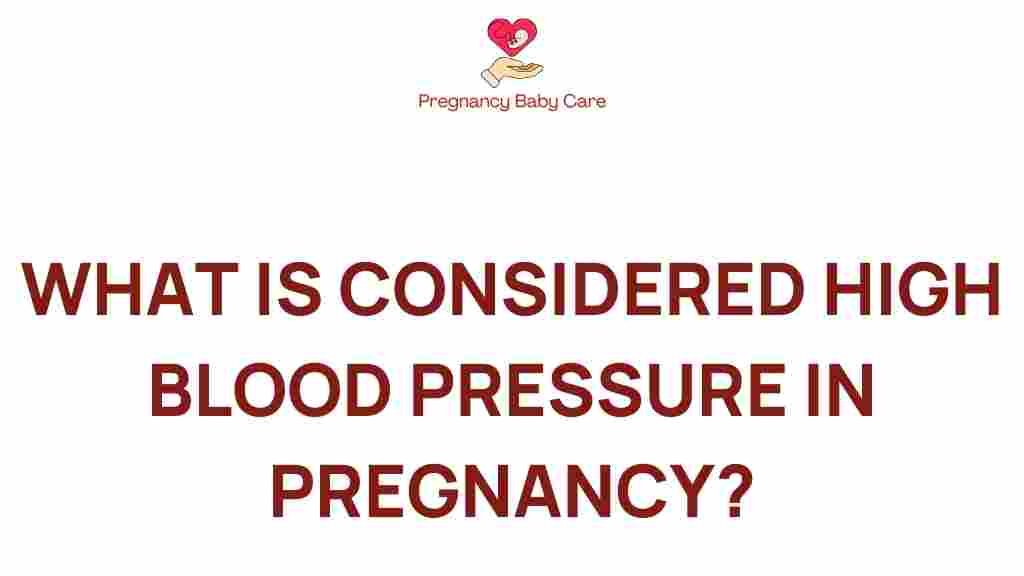Unraveling High Blood Pressure: What It Means for Pregnant Women
High blood pressure, also known as hypertension, is a significant concern during pregnancy. It affects not only maternal health but also the overall wellness of the developing fetus. Understanding the implications of high blood pressure is crucial for expecting mothers to manage their health effectively and mitigate pregnancy complications. This article will explore the importance of blood pressure monitoring, the risks associated with hypertension during pregnancy, and strategies for maintaining optimal health.
Understanding High Blood Pressure in Pregnancy
High blood pressure in pregnancy can manifest in several ways, each with potential health risks. It is essential to differentiate between chronic hypertension, which occurs before pregnancy, and gestational hypertension, which develops after 20 weeks of pregnancy. Both conditions require careful management to ensure the safety of both mother and child.
Types of Hypertension During Pregnancy
- Chronic Hypertension: High blood pressure present before pregnancy or diagnosed before the 20th week.
- Gestational Hypertension: High blood pressure that develops after the 20th week of pregnancy.
- Preeclampsia: A more severe form of gestational hypertension that can lead to serious complications.
Each type of hypertension presents unique challenges and may lead to pregnancy complications if not properly managed.
Health Risks Associated with High Blood Pressure
High blood pressure can pose various health risks for pregnant women, including:
- Placental Abruption: The placenta detaches from the uterus prematurely, leading to severe bleeding and risking the health of both mother and baby.
- Intrauterine Growth Restriction (IUGR): High blood pressure can restrict blood flow to the fetus, affecting its growth and development.
- Preterm Birth: Increased blood pressure can lead to early labor and delivery.
- Maternal Complications: Conditions such as stroke, kidney damage, or heart disease can arise from unmanaged hypertension.
Importance of Prenatal Care and Blood Pressure Monitoring
Regular prenatal care is vital for all pregnant women, especially those with a history of high blood pressure. Monitoring blood pressure throughout pregnancy allows healthcare providers to identify any issues early and implement necessary interventions. Here’s how to ensure effective monitoring:
Step-by-Step Process for Blood Pressure Monitoring
- Schedule Regular Prenatal Visits: Expectant mothers should visit their healthcare provider regularly to monitor their blood pressure and overall health.
- Self-Monitoring: Learn to measure blood pressure at home using a reliable blood pressure monitor. Keeping a log of readings can help your healthcare provider track changes over time.
- Report Changes: If you notice sudden spikes in blood pressure or symptoms such as headaches, vision changes, or swelling, contact your healthcare provider immediately.
- Follow Medical Advice: Adhere to the treatment plan prescribed by your healthcare provider, which may include medication, lifestyle changes, or increased monitoring.
Managing High Blood Pressure During Pregnancy
Managing high blood pressure is crucial for maintaining pregnancy wellness. Here are some strategies to consider:
- Healthy Diet: Focus on a balanced diet rich in fruits, vegetables, whole grains, and lean proteins. Limit salt intake to help control blood pressure.
- Regular Exercise: Engage in moderate physical activity, such as walking or prenatal yoga, to promote cardiovascular health.
- Stress Management: Implement stress-reducing techniques, such as mindfulness, meditation, or deep-breathing exercises.
- Avoid Smoking and Alcohol: Both can exacerbate high blood pressure and pose additional risks to maternal and fetal health.
Potential Pregnancy Complications from Hypertension
While many women with high blood pressure have healthy pregnancies, there are potential complications that must be monitored:
- Preeclampsia: A serious condition characterized by high blood pressure and signs of damage to other organ systems, often requiring close monitoring and potential early delivery.
- Eclampsia: A severe form of preeclampsia that can lead to seizures and serious health risks for both mother and child.
- Chronic Kidney Disease: High blood pressure can lead to kidney damage, complicating pregnancy and requiring careful management.
Troubleshooting Tips for Managing High Blood Pressure
Sometimes, despite best efforts, blood pressure may remain elevated. Here are troubleshooting tips for managing high blood pressure during pregnancy:
Identifying Warning Signs
Be aware of the following warning signs that may indicate worsening hypertension:
- Severe headaches that do not respond to usual pain relief.
- Sudden swelling in the hands or face.
- Visual disturbances, such as blurring or flashing lights.
- Persistent abdominal pain, especially in the upper right quadrant.
What to Do If You Experience Symptoms
If you experience any of the above symptoms, take the following steps:
- Contact your healthcare provider immediately.
- Keep a record of your symptoms and blood pressure readings to share with your provider.
- Follow any instructions given by your healthcare provider regarding medication adjustments or further testing.
When to Seek Emergency Care
In some cases, high blood pressure can lead to emergencies. Seek immediate medical attention if you experience:
- Severe headache that feels different from usual.
- Confusion or altered mental state.
- Severe chest pain or shortness of breath.
- Severe abdominal pain, especially if accompanied by nausea or vomiting.
Conclusion: Prioritizing Maternal Health and Pregnancy Wellness
High blood pressure during pregnancy is a manageable condition with the right care and attention. By prioritizing prenatal care, monitoring blood pressure, and staying informed about potential health risks, pregnant women can significantly reduce the likelihood of complications. Regular consultations with healthcare providers, adherence to treatment plans, and proactive management of lifestyle factors are key components in ensuring a healthy pregnancy.
For more information on managing high blood pressure during pregnancy, visit this resource. Remember, your health and the health of your baby are paramount; don’t hesitate to reach out to your healthcare provider with any concerns. Together, you can navigate the challenges of pregnancy and promote both maternal and fetal wellness.
For additional insights on prenatal care and maternal health, check out our article on best practices for pregnancy wellness.
This article is in the category Pregnancy and created by PregnancyBabyCare Team
